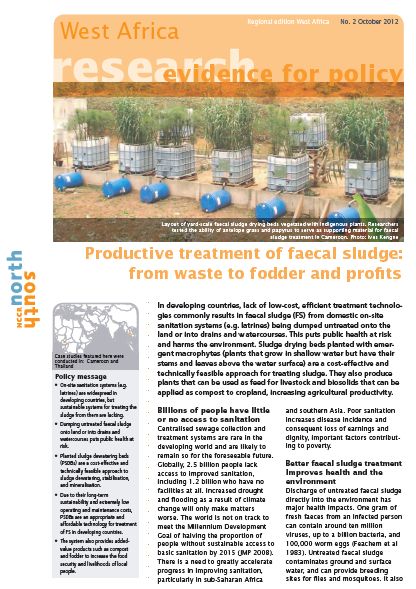Productive treatment of faecal sludge: from waste to fodder and profits - Evidence for Policy Series, Regional edition West Africa, No. 2
Kengne, I. M., Kouassi, D., Doulaye, K., Strande, L. (2012)

Published in: 2012
Publisher:
ed. Bassirou Bonfoh. Abidjan, Côte d’Ivoire: NCCR North-South
Author:
Kengne, I. M., Kouassi, D., Doulaye, K., Strande, L.
Uploaded by:
SuSanA secretariat
Partner profile:
common upload
4999 Views
135 Downloads
Location of library entry
Content - Summary
In developing countries, lack of low-cost, efficient treatment technologies commonly results in faecal sludge (FS) from domestic on-site sanitation systems (e.g. latrines) being dumped untreated onto the land or into drains and watercourses. This puts public health at risk and harms the environment. Sludge drying beds planted with emergent macrophytes (plants that grow in shallow water but have their stems and leaves above the water surface) are a cost-effective and technically feasible approach for treating sludge. They also produce plants that can be used as feed for livestock and biosolids that can be applied as compost to cropland, increasing agricultural productivity.
Policy messages:
• On-site sanitation systems (e.g. latrines) are widespread in developing countries, but sustainable systems for treating the sludge from them are lacking.
• Dumping untreated faecal sludge onto land or into drains and watercourses puts public health at risk.
• Planted sludge dewatering beds (PSDBs) are a cost-effective and technically feasible approach to sludge dewatering, stabilisation, and mineralisation.
• Due to their long-term sustainability and extremely low operating and maintenance costs, PSDBs are an appropriate and affordable technology for treatment of FS in developing countries.
• The system also provides added value products such as compost and fodder to increase the food security and livelihoods of local people.
Case studies featured here were conducted in: Yaounde (Cameroon) and Bangkok (Thailand)
Bibliographic information
Kengne, I. M., Kouassi, D., Doulaye, K., Strande, L. (2012). Productive treatment of faecal sludge: from waste to fodder and profits - Evidence for Policy Series, Regional edition West Africa, No. 2. ed. Bassirou Bonfoh. Abidjan, Côte d’Ivoire: NCCR North-South
Filter tags
East Asia & Pacific English Faecal sludge treatment processes Guidelines and manuals Sub-Saharan Africa Urban (entire city)















